The fourth annual Tata Consultancy Services-EducationWorld Teachers Awards 2008 attracted 18,000 nominations from 2,500 schools across the country. At a meticulously planned awards ceremony staged in Lucknow, the eight finalists — all women —were showered with cash awards, certificates and mementos. Summiya Yasmeen reports
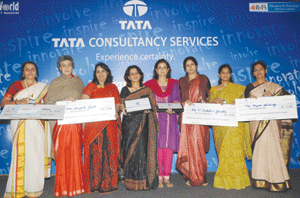 A mix of emotions — hope, excitement, optimism, anxiety and joy — pervaded the charged atmosphere of the sprawling Crystal Room of the Taj Residency Hotel, Lucknow, where 178 teachers from 53 schools in the city convened for a ‘Learning by Discovery’ workshop and the Tata Consultancy Services-EducationWorld Teachers Awards 2008, on November 18. Eight primary and secondary school teachers from across the country, were invited (all-expenses paid) to the city of nawabs for the final round of interviews, to determine who among the 18,000 teachers nominated by 2,500 schools countrywide, would be selected India’s most innovative primary and secondary teachers.
A mix of emotions — hope, excitement, optimism, anxiety and joy — pervaded the charged atmosphere of the sprawling Crystal Room of the Taj Residency Hotel, Lucknow, where 178 teachers from 53 schools in the city convened for a ‘Learning by Discovery’ workshop and the Tata Consultancy Services-EducationWorld Teachers Awards 2008, on November 18. Eight primary and secondary school teachers from across the country, were invited (all-expenses paid) to the city of nawabs for the final round of interviews, to determine who among the 18,000 teachers nominated by 2,500 schools countrywide, would be selected India’s most innovative primary and secondary teachers.
The four primary and equal number of secondary school teachers from seven cities had been short-listed on the basis of essays outlining their classroom innovations. Following grueling 40 minute interviews with a three-judge panel — comprising Mala Ramadorai, former vice principal of the Bombay International School; Neena Paul, assistant vice-president IL&FS-ETS and Dilip Thakore, publisher-editor of EducationWorld — the results were announced and the crowded ballroom exploded into applause. Nomita Roy, head of the junior school science faculty of the Vasant Valley School, Delhi, was adjudged the country’s most innovative primary school teacher and Indrani Singh, principal of ADLS Sunshine School, Jamshedpur, the most innovative in the secondary category.
Instituted in 2005 by the Mumbai-based Tata Consultancy Services (revenue: Rs.28,500 crore in fiscal 2007-08), India’s largest IT services company with 119,000 employees in 42 countries worldwide, and EducationWorld, India’s pioneer education news and analysis magazine (estb.1999), the annual TCS-EW Awards encourage and inspire teachers to innovate new practices and pedagogies, to make learning joyful and improve learning outcomes.
.gif) “As a company which highly values business and technology innovations, it’s our privilege to honour teachers who are pioneering innovations in the nation’s classrooms. Together with EducationWorld, we are happy to provide teachers the opportunity to showcase and share their best practices with teachers countrywide,” said S. Ramadorai, the Mumbai-based chief executive and managing director of the globe-girdling TCS, in a special message sent to the convocation, which he was unable to attend due to unforeseen business reasons.
“As a company which highly values business and technology innovations, it’s our privilege to honour teachers who are pioneering innovations in the nation’s classrooms. Together with EducationWorld, we are happy to provide teachers the opportunity to showcase and share their best practices with teachers countrywide,” said S. Ramadorai, the Mumbai-based chief executive and managing director of the globe-girdling TCS, in a special message sent to the convocation, which he was unable to attend due to unforeseen business reasons.
At the meticulously planned awards ceremony staged in Lucknow, where TCS recently inaugurated a spanking new seven-storey 127,000 sq. ft. office, the eight finalists — all women — were showered with cash awards, certificates and mementos. Best teachers Nomita Roy (primary) and Indrani Singh (secondary) were presented state-of-the-art laptop computers in addition to cheques of Rs.10,000, which were also awarded to the other six finalists. Moreover, all finalists were awarded specially commissioned TCS-EW silver and acrylic embossed trophies.
The process of selecting India’s most innovative school teachers began with repeated advertising of the awards in EducationWorld, and a poster campaign in schools across the country. The advertisements/posters invited all involved with education — principals, parents, school managements and students — to nominate innovative and/or exceptional teachers (in primary and secondary schools) for the awards. The 18,000 nominations received were scrutinised by IL&FS Education and Technology Services Ltd (IETS), the 11-year-old education consultancy and training subsidiary of the Mumbai-based construction and infrastructure financing giant IL&FS, which made a preliminary short-list of 500 teachers, who were asked to submit 300-500 word essays detailing their classroom innovations and best practices. Of the 500 solicited, 50 essays were received within the prescribed deadline (November 6).
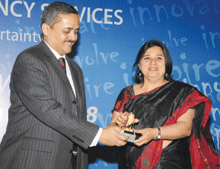 After careful assessment and evaluation of essays received from school teachers country-wide, eight classroom innovators were invited for personal interview in Lucknow. “The overwhelming majority of nominations received, detailed the achievements and previous awards of the nominees, rather than their classroom innovations and creative best practices. Therefore, we had quite a job on our hands choosing the best out of thousands of experienced teachers with impressive achievements. I hope next year, nominators will highlight teachers’ creativity and innovations which need to be disseminated to help raise teaching-learning standards countrywide,” said IL&FS-ETS assistant vice-president Neena Paul speaking on the occasion.
After careful assessment and evaluation of essays received from school teachers country-wide, eight classroom innovators were invited for personal interview in Lucknow. “The overwhelming majority of nominations received, detailed the achievements and previous awards of the nominees, rather than their classroom innovations and creative best practices. Therefore, we had quite a job on our hands choosing the best out of thousands of experienced teachers with impressive achievements. I hope next year, nominators will highlight teachers’ creativity and innovations which need to be disseminated to help raise teaching-learning standards countrywide,” said IL&FS-ETS assistant vice-president Neena Paul speaking on the occasion.
Winners and finalists of the Tata Consultancy Services-EducationWorld Teachers Awards 2008 are profiled on the pages following.
Nomita Roy
Most innovative primary teacher
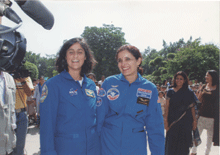 Nomita Roy, junior school science head of Delhi’s Vasant Valley School (estb.1990), was adjudged India’s most innovative primary school teacher by the jury of the Tata Consultancy Services-EducationWorld Teachers Awards 2008. In her presentation to the judges’ panel, Roy described the creative pedagogies she employs to engage her students in the study of science subjects. “I’m delighted that my teaching innovations have been recognised. I believe a major share of the credit for this award should be given to the Vasant Valley School management which encourages creativity in teaching,” says Roy. A science and education alumna of Garhwal and Annamalai universites, Roy signed up with the CSBE affiliated Vasant Valley School (ranked 5th (north zone) in the EducationWorld Survey of Day Schools 2008) ab initio following a two-year stint with the Modern School, Delhi.
Nomita Roy, junior school science head of Delhi’s Vasant Valley School (estb.1990), was adjudged India’s most innovative primary school teacher by the jury of the Tata Consultancy Services-EducationWorld Teachers Awards 2008. In her presentation to the judges’ panel, Roy described the creative pedagogies she employs to engage her students in the study of science subjects. “I’m delighted that my teaching innovations have been recognised. I believe a major share of the credit for this award should be given to the Vasant Valley School management which encourages creativity in teaching,” says Roy. A science and education alumna of Garhwal and Annamalai universites, Roy signed up with the CSBE affiliated Vasant Valley School (ranked 5th (north zone) in the EducationWorld Survey of Day Schools 2008) ab initio following a two-year stint with the Modern School, Delhi.
During her 18 years at Vasant Valley, Roy has enjoyed considerable latitude and freedom to develop and expand the junior school’s science faculty. She helped set up a state-of-the-art science laboratory for the primary school, organised field trips and outdoor activities for experiential learning, and co-authored the Hook Line and Thinker Science Series textbooks (published by Learn Today), for class II and III students, which are also being used in other schools in Delhi.
Roy attributes declining student interest in the sciences to dull and mechanical pedagogies employed in primary-secondary education. “Exclu-ding a handful of progressive private schools, science subjects are taught as abstract disciplines unconnected with everyday life. Science subjects can’t be taught through chalk-n-talk. They need to be learned through practicals and extensive experimentation. It’s important for teachers to connect the sciences with nature, ecology and inventions, so that students become interested in discovering the world they live in. This process must begin in primary school,” says Roy who is currently developing a science curriculum for three-ten year olds designed to “bridge the gap in science learning between rural and urban India”.
One of six teachers from India to be selected for the Boeing Teacher Training Astronaut Program of the NASA Space and Rocket Centre, Huntsville, Alabama (USA), Roy spent two exciting weeks in July 2007, learning about flight simulation, planning and execution of space missions, and interacting with famous astronauts.
Obviously enthused by the desire to share this once-in-a-lifetime experience with her students and colleagues, on her return from NASA Roy launched the school’s maiden space program. The first initiative of this program was a telebridge talk with NASA astronaut Sunita Williams from the International Space Station. “Vasant Valley was one of four schools worldwide to organise a telebridge interaction with Sunita Williams, who subsequently visited our school campus and met with students and teachers,” says Roy, who is also in charge of the school’s adolescent (sex) education programme.
A committed educationist, Roy wants to share her learning and expertise with less privileged children in rural India. “It’s my dream to start a school in Chamsaui, a village near Mussoorie, where my family has some land. The recognition and encouragement I’ve received at the TCS-EW Teachers Awards has reinforced my determination to realise this dream,” she says.
The force be with you!
Indrani Singh
India’s best secondary teacher
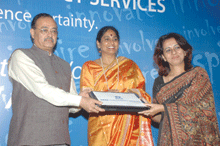 Out-of-the box thinker and outstanding institutional leader Indrani Singh, principal of ADLS Sunshine School, Jamshedpur, was adjudged India’s most innovative secondary school teacher at the TCS-EducationWorld Teachers Awards 2008 ceremony held in the packed Crystal Room of the Taj Residency, Lucknow. A law and education graduate of Mangalore and Annamalai universities, Singh was appointed principal of the ICSE-affiliated, co-ed ADLS Sunshine School in November last year, after acquiring 14 years of experience teaching geography and English to secondary students at the steel city’s DBMS English School.
Out-of-the box thinker and outstanding institutional leader Indrani Singh, principal of ADLS Sunshine School, Jamshedpur, was adjudged India’s most innovative secondary school teacher at the TCS-EducationWorld Teachers Awards 2008 ceremony held in the packed Crystal Room of the Taj Residency, Lucknow. A law and education graduate of Mangalore and Annamalai universities, Singh was appointed principal of the ICSE-affiliated, co-ed ADLS Sunshine School in November last year, after acquiring 14 years of experience teaching geography and English to secondary students at the steel city’s DBMS English School.
Within a year of taking charge, this can-do principal has introduced several administrative and teaching innovations to improve learning outcomes in the K-12 ADLS Sunshine School, which has 1,256 students instructed by 142 teachers on its muster roll. Among them: introduction of compulsory ICT training for the school’s teachers; developing an ‘error analysis’ system for teachers to identify the academic shortcomings of students followed up with remedial classes; and constituting an infrastructure maintenance committee to maintain and upgrade the school’s buildings, furniture and playgrounds.
“I am pleased to receive this award on behalf of my students and colleagues who have encouraged and whole-heartedly supported my initiatives. Unfortunately, though teachers discharge the vitally important role of nurturing tomorrow’s leaders, they receive scant respect and recognition in society. Therefore I’m grateful that TCS and EW have taken the lead in acknowledging the invaluable work of teachers across the country. This award has inspired me to take my vision forward and share our knowledge and innovations with other schools in Jamshedpur and eastern India,” says Singh.
Yet the critical factor which prompted the judges panel to adjudge her the country’s most innovative secondary teacher was her initiative to introduce a road safety curriculum in schools in Jamshedpur, the business capital of the state of Jharkhand (pop. 26.9 million). Concerned about the high incidence of fatal accidents on the city’s roads, Singh designed an innovative set of guidelines titled ‘Traffic Etiquette — A Curriculum on Road Safety’ for school students. The publication includes a model code of conduct for motorists and road users, suggestions on how to react to accidents and traffic jams, and details traffic rules governing cyclists and pedestrians.
“The objective of this booklet is to spread road safety awareness among school students, to make Jamshedpur an accidents-free city. Stated simply, Traffic Etiquette recommends the practice of drawing room manners while on the road. The indicators are good. The district administration plans to introduce Traffic Etiquette in all schools in Jamshedpur from the next academic session,” says Singh who is also a member of Road Safe, an organisation set up by Tata Steel to monitor the safety of children in the city. A staunch believer that teachers have a far greater role to play in developing the overall personality of children, Singh has also scripted and directed a moving documentary on child scavengers titled From Dawn to Dusk.
Enthused by the encomiums she received at the TCS-EW Awards ceremony, Singh has set herself the goal of transforming ADLS Sunshine School, into “Jamshedpur’s top school within the next five years”.
Sangita Gupta
Inspirational art teacher
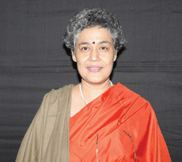 As head of the fine arts faculty of the CBSE-affiliated K-12 Study Hall College, Lucknow, Sangita Gupta has transformed her weekly two-hour art classes from prosaic drawing periods into centres of creativity, innovation and flowering talent. A fine arts postgraduate of Kanpur University who started her career as a painter, Gupta impressed the judges’ panel with the innovative pedagogies she has developed to stimulate student creativity and self-expression.
As head of the fine arts faculty of the CBSE-affiliated K-12 Study Hall College, Lucknow, Sangita Gupta has transformed her weekly two-hour art classes from prosaic drawing periods into centres of creativity, innovation and flowering talent. A fine arts postgraduate of Kanpur University who started her career as a painter, Gupta impressed the judges’ panel with the innovative pedagogies she has developed to stimulate student creativity and self-expression.
“Creativity is an attribute which is latent in all children, and the fine arts —drawing, painting, sculpture — are natural media of self-expression. But sadly in most schools, art teachers stifle children’s creativity by emphasising conformity and reproduced art. This is the surest way of killing the natural spirit of innovation and creativity of children,” says Gupta, who signed up with Study Hall back in 1986, and has since played an important role in contemporising the school’s fine arts faculty and curriculum.
In her 22 years as a primary/secondary school art teacher at Study Hall, which boasts an enrollment of 2,000 students tutored by 150 teachers, this committed “facilitator” has redefined traditional classroom practices. Thus in her art classes students are encouraged to project their personalities and opinion on paper and canvas without following set guidelines, with the timid and hesitant nudged along with hints and suggestions. “In our art classes the sky need not be blue, nor the mountains brown. When their creativity is let loose, children become creators of new knowledge and develop their own perspectives,” says Gupta, who made time from her teaching duties to recently stage a solo exhibition of acrylic/oil paintings at the Lalit Kala Centre, Lucknow, and create illustrations and design promotional material for Unicef and NGOs Mahila Samakhya and Ankur.
Among Gupta’s innovations which were appreciated by the judges, who awarded her a special commendation, are use of instrumental music to create enabling environments in art classes; motivating students by displaying the most creative works of art on the school notice board, and exposing students to the work of great masters. A professional artist herself, Gupta has painstakingly prepared a slide show of some of the greatest artists. “As we study their lives and works in class, we also discuss their motives, inspiration, techniques and social messages, if any. This is a great way of inculcating art appreciation in children. Moreover in competitive academic environments, fine arts helps children to de-stress and recharge body, mind and soul,” says Gupta.
Malvika Vohra
Science education savant
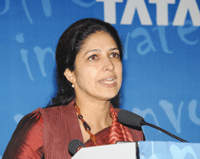 “Continuous teacher education is critical to deliver acceptable quality education in the country’s classrooms. Poor quality teacher education in the country’s B.Ed colleges, aggravated by minimal in-service teacher training, is the blindspot of the school system in India. To enrich the classroom experiences of students, this deficiency needs to be addressed urgently,” says Malvika Vohra, head of the science faculty of Delhi’s CBSE-affiliated Vasant Valley School, promoted by India Today publisher-editor Aroon Purie, which had the distinction of two of its teachers being short-listed for the TCS-EW Teachers Awards 2008.
“Continuous teacher education is critical to deliver acceptable quality education in the country’s classrooms. Poor quality teacher education in the country’s B.Ed colleges, aggravated by minimal in-service teacher training, is the blindspot of the school system in India. To enrich the classroom experiences of students, this deficiency needs to be addressed urgently,” says Malvika Vohra, head of the science faculty of Delhi’s CBSE-affiliated Vasant Valley School, promoted by India Today publisher-editor Aroon Purie, which had the distinction of two of its teachers being short-listed for the TCS-EW Teachers Awards 2008.
A botany postgraduate of Delhi University with a B.Ed from Delhi’s Central Institute of Education, who started teaching in Vasant Valley in 1993, Vohra was a prime mover behind the establishment of dedicated chemistry and biology labs for senior school students. Unsurprisingly, she also actively supervises the school’s in-service training programmes for Vasant Valley’s 14 science teachers.
Vohra impressed the judges’ panel with her Citizens Science Program (2002) which stimulates student interest in science subjects and environment issues, by arranging guest lectures, film shows, workshops and exhibitions. Moreover she has played a key role in drawing up a challenging science curriculum comprising a mix of classroom teaching, project work, multimedia presentations, field trips and group activities. Passionate about preservation of the national capital’s ecology and environment, she has documented the trees of Delhi’s Lodi Gardens and is a fellow of LEAD (Leadership for Environment and Development) International, a Rockefeller Foundation-supported worldwide initiative of individuals and NGOs committed to sustainable development.
Vohra is alarmed by declining student interest in the sciences and falling enrollment in science programmes of colleges and universities countrywide. “Innovations in teaching science and maths in primary and secondary education apart, government and industry have to start paying scientists and researchers on a par with other skilled professionals, and also invest substantially in R&D (research and development). This is an urgent necessity, as without innovation and creativity leaps in science and technology, India will never attain first world status,” warns Vohra who received high praise and a special commendation from the awards panel.
Mysore Sri Durga
Child-centric primary teacher
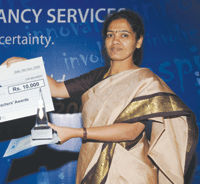 “It’s sufficient recognition to be acknowledged as one of the eight most innovative teachers of the country. There couldn’t be a better learning experience than discussing and exchanging notes with the best teachers from across India. The recognition and appreciation we’ve received here has inspired me and all of us to make renewed efforts to make learning a joyful experience for our students,” says Mysore Sri Durga, an English, EVS (environmental science) and maths primary school teacher at the CBSE-affiliated K-X Bharatiya Vidya Bhavan Public School (BVBPS), Hyderabad, which has an enrollment of 3,000 students instructed by 120 teachers.
“It’s sufficient recognition to be acknowledged as one of the eight most innovative teachers of the country. There couldn’t be a better learning experience than discussing and exchanging notes with the best teachers from across India. The recognition and appreciation we’ve received here has inspired me and all of us to make renewed efforts to make learning a joyful experience for our students,” says Mysore Sri Durga, an English, EVS (environmental science) and maths primary school teacher at the CBSE-affiliated K-X Bharatiya Vidya Bhavan Public School (BVBPS), Hyderabad, which has an enrollment of 3,000 students instructed by 120 teachers.
A chemistry postgraduate of Osmania and Acharya Nagarjuna (Guntur) universities who also has a B.Ed degree from Nav Bharati College of Education, Hyderabad, Durga signed up with BVBPS in 1997. She received a special commendation from the judges’ panel for her innovative application of Circle Time (a classroom activity which encourages positive behaviour in children), and for devising a ‘Speaking Tree’ pedagogy for slow learners.
“In Circle Time, pioneered by British educationist Jenny Mosley, students have to stand/sit in a circle, with each one encouraged to open up and talk about issues which promote self-esteem and positive behaviour. I have used this teaching-learning programme to enrich students’ vocabulary and communication skills, and boost their self-confidence. Moreover it was from Circle Time that I devised the Speaking Tree programme, which has each leaf of a tree ‘speaking’ positively about slow learners in class. The purpose of this pedagogy is to encourage slow learners by appreciating their effort and progress. This motivates them to improve,” says Durga. Moreover to stimulate eco-awareness at an early age, she regularly organises field trips, and highlights issues such as water conservation, pollution and global warming.
Nor is the TCS-EW Teachers Award certificate and trophies the first of her encomiums. Recently she was conferred the Scholastic Teachers Day Honors Award for “encouraging students to open up and communicate” and was awarded a certificate of commendation for preparing BVBPS students to participate in the National Science Olympiad.
Shamim Siddiq Lakhani
Engaging maths teacher
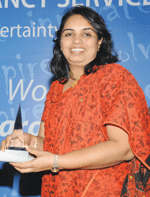 A primary school (classes III-IV) maths and science teacher at the Children’s Academy, Malad, Mumbai, Shamim Lakhani believes that children learn best through experimentation and activity. Thus in her classes, students experience activity-based teaching, learning through role play and project assignments rather than memorisation of facts and formulae. Her use of low-cost teaching materials to help children understand fractions and the basics of geometry won her a place in the finals of the TCS-EW Teachers Awards 2008.
A primary school (classes III-IV) maths and science teacher at the Children’s Academy, Malad, Mumbai, Shamim Lakhani believes that children learn best through experimentation and activity. Thus in her classes, students experience activity-based teaching, learning through role play and project assignments rather than memorisation of facts and formulae. Her use of low-cost teaching materials to help children understand fractions and the basics of geometry won her a place in the finals of the TCS-EW Teachers Awards 2008.
“Children remember only 10 percent of what they read, while they retain 90 percent of what they learn by experiments and demonstration. For instance when teaching fractions, I cut a slice of bread into four parts to demonstrate how quarters make up a whole. To explain the definition of a triangle, I use chart paper with bright colours. Visual aids help children understand and retain better,” says Lakhani.
A commerce graduate of Bombay University, who began her career as an accountant in the Development Credit Bank (1986-89), Lakhani took a 12-year break to raise her two children before “by chance”, in 2002, she filled in for a friend on maternity leave at the Lawrence School, Mumbai. “During those six months I realised that teaching was my true calling, and that I enjoyed being with children. Therefore I enrolled in the one-year B.Ed programme of Bombay University in 2004,” recalls Lakhani, who came aboard Children’s Academy, a state board affiliated school with an enrollment of over 5,000 students, immediately after graduation in 2005.
Despite being a relatively new entrant into the teachers’ profession, Lakhani impressed the panel with her inventive classroom practices, such as blending new information communication technologies with visual aids to enhance the learning experience of students in crowded classes.
“In most schools, especially at the primary level, there are more than 50 students in each class. Projectors, multimedia and other IT-enabled technologies should be used to engage students’ attention and teach difficult concepts. It’s important to create interesting, student-friendly classrooms where children are encouraged to ask questions, share their experiences and enjoy the learning process. Interacting with teachers from across the country at the TCS-EW Teachers Awards has motivated me to upgrade and innovate even more, to make the usually dreaded maths and science subjects interesting for my students,” says Lakhani, also a sportswoman who has won several college and district-level badminton, basketball and table tennis tournaments.
Preetha Balakrishnan
Co-curricular education evangelist
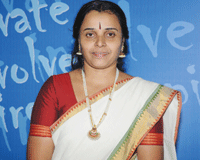 A renowned kathakali (the traditional dance form of Kerala) artiste, poet and singer, Preetha Balakrishnan incorporates her performing arts skills to teach Malayalam to senior school students (class VIII-X) of the state board affiliated St. Anthony Higher Secondary School, Cochin.
A renowned kathakali (the traditional dance form of Kerala) artiste, poet and singer, Preetha Balakrishnan incorporates her performing arts skills to teach Malayalam to senior school students (class VIII-X) of the state board affiliated St. Anthony Higher Secondary School, Cochin.
“In this age of global television, internet and the ipod, it’s almost impossible to retain students’ attention by teaching from textbooks. It’s necessary to innovate pedagogies to enrich the classroom experience. Therefore I use narratives, role playing, music, history and specially prepared CD-Roms to enthuse children to learn the ancient and culturally rich Malayalam language,” says Balakrishnan, who recently released an animation video CD Midumidukkan, a collection of six value-based stories.
A postgraduate in Malayalam language and literature of Kerala University, Thiruvananthapuram with a B.Ed from Mahatma Gandhi University, Kottayam, she began her career as a teacher at the CBSE-affiliated Greets Academy, Ernakulam, in 1996. In 2007 she accepted an invitation to teach Malayalam to high school students at the state-government aided St. Anthony’s Higher Secondary.
Deeply committed to preserving and propagating the traditional art forms of the southern state of Kerala (pop. 32 million), Balakrishnan has taken the initiative to prepare St. Anthony students for city and state level performing arts competitions. Moreover through the medium of music, dance and drama, she also propagates positive messages about environment conservation and tree plantation.
A winner of the Air India-Manorama Best Teacher Award 2006, Balakrishnan believes that integration of history and mythology of native cultural traditions into curriculums can enrich and liven up classrooms. “By fusing dance, drama and story-telling with teaching, teachers can dramatise their students’ learning experience to make it memorable and enjoyable. Latest information communication technologies make this quite easy. As teachers, our first priority should be to instill love of learning in students and to make classrooms interesting and interactive,” she says.
Lakshmi Gandhi
Innovative maths facilitator
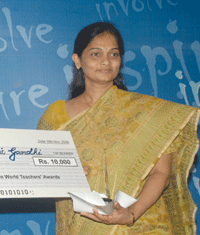 In a teaching career spanning two decades, V. Lakshmi Gandhi, who teaches mathematics at the state board affiliated Abhinava Vidyalaya English Medium High School (AVEM), Pune, has devoted many hours of her own time to developing activity-based pedagogies designed to make maths learning an enjoyable experience for her class VIII-X students.
In a teaching career spanning two decades, V. Lakshmi Gandhi, who teaches mathematics at the state board affiliated Abhinava Vidyalaya English Medium High School (AVEM), Pune, has devoted many hours of her own time to developing activity-based pedagogies designed to make maths learning an enjoyable experience for her class VIII-X students.
“Mechanical textbook approaches to teaching maths has prompted unwarranted maths phobia in Indian society. On the contrary, maths is an exciting subject if teachers discover alternative, interactive and exploratory ways to teach the subject. I have developed activity-based programmes using low-cost teaching aids, puzzles and games to illustrate mathematical concepts. Moreover we have instituted a maths lab in our school in which students can use teaching-learning aids, perform mathematical experiments, play math games, and learn the subject in hands-on practical ways,” says Gandhi who sufficiently impressed the judges of the TCS-EW Teachers Awards 2008 to win a special commendation.
One of six maths and science teachers in India to be selected for the Honeywell-sponsored Teacher Training Astronaut Program of the NASA Space and Rocket Centre, Huntsville, Alabama (USA), on her return to India in June last year, Gandhi established a space lab in AVEM. Moreover in June this year she mentored and accompanied 60 students from Pune and Mumbai schools on a 12-day educational trip to the NASA Space and Rocket Centre in Alabama. “It’s important to connect the learning of mathematics with great advances of technology. It helps students to appreciate the relevance of learning the subject,” she says.
A woman of many interests, Gandhi is a sports lover and quizzer, who organised the first sports quiz for class X-XII students in Pune and also helped train and mentor an AVEM team for the ESPN School Quiz Olympiad, which they won in 2004. “Participation in quiz competitions makes students confident, sharpens memory and develops quick decision making skills,” says Gandhi, who as we go to press, has accepted an offer to teach maths at the CSBE-affiliated Indira National School, Pune.